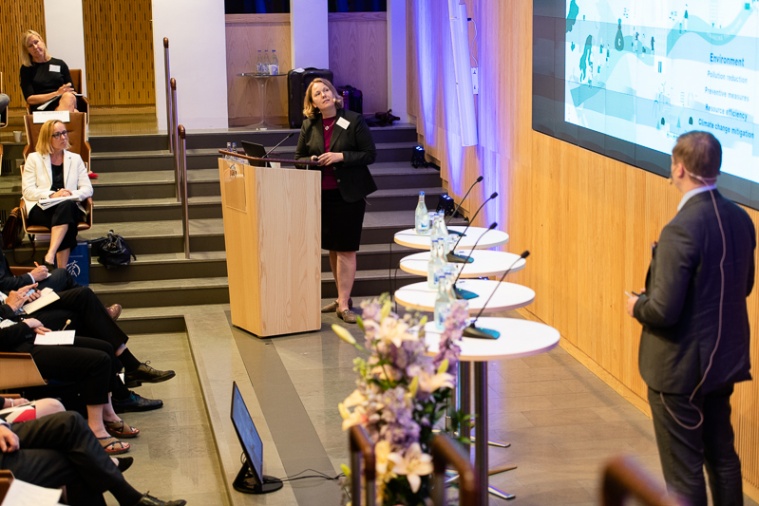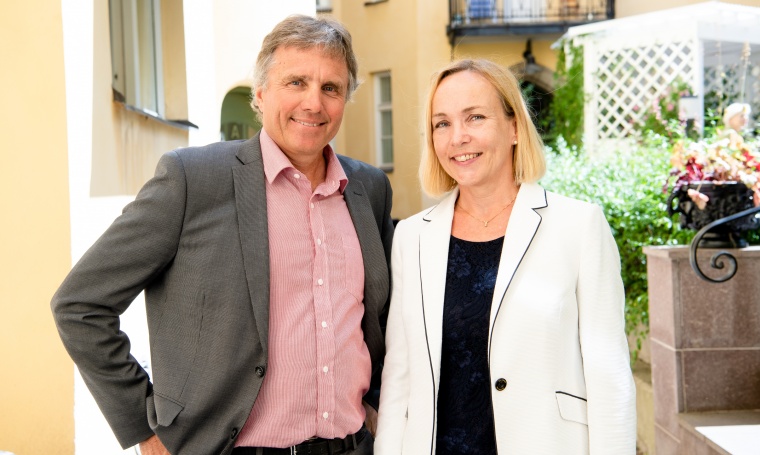NIB co-hosts “Climate Strategies in Other Countries” seminar in Stockholm

What challenges are countries facing when they prepare their strategies for achieving climate goals, and what can they learn from each other on the way? This was discussed during the seminar “Climate Strategies in Other Countries”, co-hosted by NIB and the Royal Swedish Academy of Engineering Sciences (IVA) on 12 June in Stockholm.
A good mix of international scientists and representatives of industry, business life, politics and municipalities participated in the event, opened by Thomas Wrangdahl, NIB’s Vice-President and Head of Lending, and Tuula Teeri, President of IVA. The speakers represented Sweden, Germany, the UK, Canada and China, and Ola Alterå, Director of the Swedish Climate Policy Council, acted as moderator.
During the seminar, Lena Korkea-aho, NIB’s Senior Environmental Analyst, and Patrik Marckert, Senior Lending Manager, described the Bank’s criteria for financing projects aiming to have a positive climate impact. Ms Korkea-aho started by giving an overview of global investment needs connected to climate targets.
 Lena Korkea-aho, NIB’s Senior Environmental Analyst, and Patrik Marckert, Senior Lending Manager, described the Bank’s criteria for financing projects aiming to have a positive climate impact. Image: Erik Cronberg
Lena Korkea-aho, NIB’s Senior Environmental Analyst, and Patrik Marckert, Senior Lending Manager, described the Bank’s criteria for financing projects aiming to have a positive climate impact. Image: Erik Cronberg
“In order to achieve the target of the Paris agreement—which is to limit global warming to well below two degrees—the additional investment requirement by year 2060 is approximately USD 48 trillion. It is a significant number, but if you break it down, it corresponds to 0.4% of the cumulative global GDP during the same time period. Presented in that form the investment cost sounds achievable”
Ms. Korkea-aho also emphasized that for the industry and business life, climate measures do not only mean additional costs.
“Beyond climate change benefits, the investments will also to a certain degree lead to fuel savings, reduced health costs due to air quality improvements and increased energy security.”
The speakers:
Professor Tuula Teeri, President, IVA
Thomas Wrangdahl, First Vice-President, Head of Lending, NIB
Elisabeth Nilsson, Chairman of the project “Climate Crossroads”, Sweden
Dr Carsten Rolle, BDI Germany (Federation of German Industries, Germany
Professor John Loughhead, Chief Scientific Adviser at the Department for Business, Energy and Industrial Strategy (BEIS), UK
Dr Guoyi Han, Senior Research Fellow, Stockholm Environment Institute, Sweden
Dr Amy Sopinka, Director, Transmission and Interjurisdictional Branch of the BC Ministry of Energy Mines and Petroleum Resources, British Columbia, Canada
Lena Korkea-aho, Senior Environmental Analyst, Sustainability & Mandate unit, NIB
Patrik Marckert, Senior Manager, Lending department, Energy & Environment, NIB
Climate Crossroads—preparing Sweden for net zero emissions
The seminar “Climate Strategies in Other Countries” was part of IVA’s ongoing project “Climate Crossroads”, with the aim of preparing a climate action plan for Sweden. NIB met with IVA’s energy expert and Senior Project Manager Karin Byman, who says that arranging forums like this, where international experience and expertise can be shared, is a central part of the project.
“No country can solve climate issues on its own. Sweden is fortunate regarding renewable resources, but we are highly dependent on actions in other countries to achieve the goals—regarding technological development, market development and common instruments. We need to get input on the actions of other countries in order to understand our role in an international context. At the same time, we want to express our view of how to reduce the negative climate impact of human activities.”
The ambitious goal for Sweden is to achieve net zero emissions of greenhouse gases by 2045, and at the same time to sharpen the country’s competitive edge. How will this be done?
“We want to focus on the comparative advantages we have in energy in combination with high industrial expertise and well-developed infrastructure. The approach in the Climate Crossroads project is interdisciplinary, finding ways to optimise the implementation and use of new technology—not to develop it.”
The project engages more than 100 people from different types of organisations, in several working groups. Ms Byman explains that the aim is to get a comprehensive overview of the challenges and possibilities.”
“We will identify obstacles and opportunities in the climate work at system level. This includes technical systems, collaboration between actors in the public and private sectors, and regulation. But it also means following how Sweden is impacted by developments internationally. In order to avoid conflicting objectives and sub-optimisation, we try to identify complex connections and increase understanding of how both society and the energy system are related.”
Ms Byman points out that the transitions now taking place in societies are to a great extent politically driven—by taxes on CO2, the EU Emissions Trading System, subsidies and clear climate goals.
“In this project, we have a reference group with politicians from all parties in the Swedish Parliament. They have been involved from the very beginning, so that together we can increase the level of knowledge of how to achieve the climate goals. So, of course, our aim is for the proposals we bring forward to lead to political action. However, as we saw here at the seminar today, the politicians set the rules for the transition, but it is business life and industry that is the engine for implementation,” she concludes.
 IVA’s Senior Project Manager and energy expert Karin Byman and NIB’s Vice-President and Head of Lending Thomas Wrangdahl were pleased about IVA’s and NIB’s seminar cooperation. Image: Erik Cronberg
IVA’s Senior Project Manager and energy expert Karin Byman and NIB’s Vice-President and Head of Lending Thomas Wrangdahl were pleased about IVA’s and NIB’s seminar cooperation. Image: Erik Cronberg